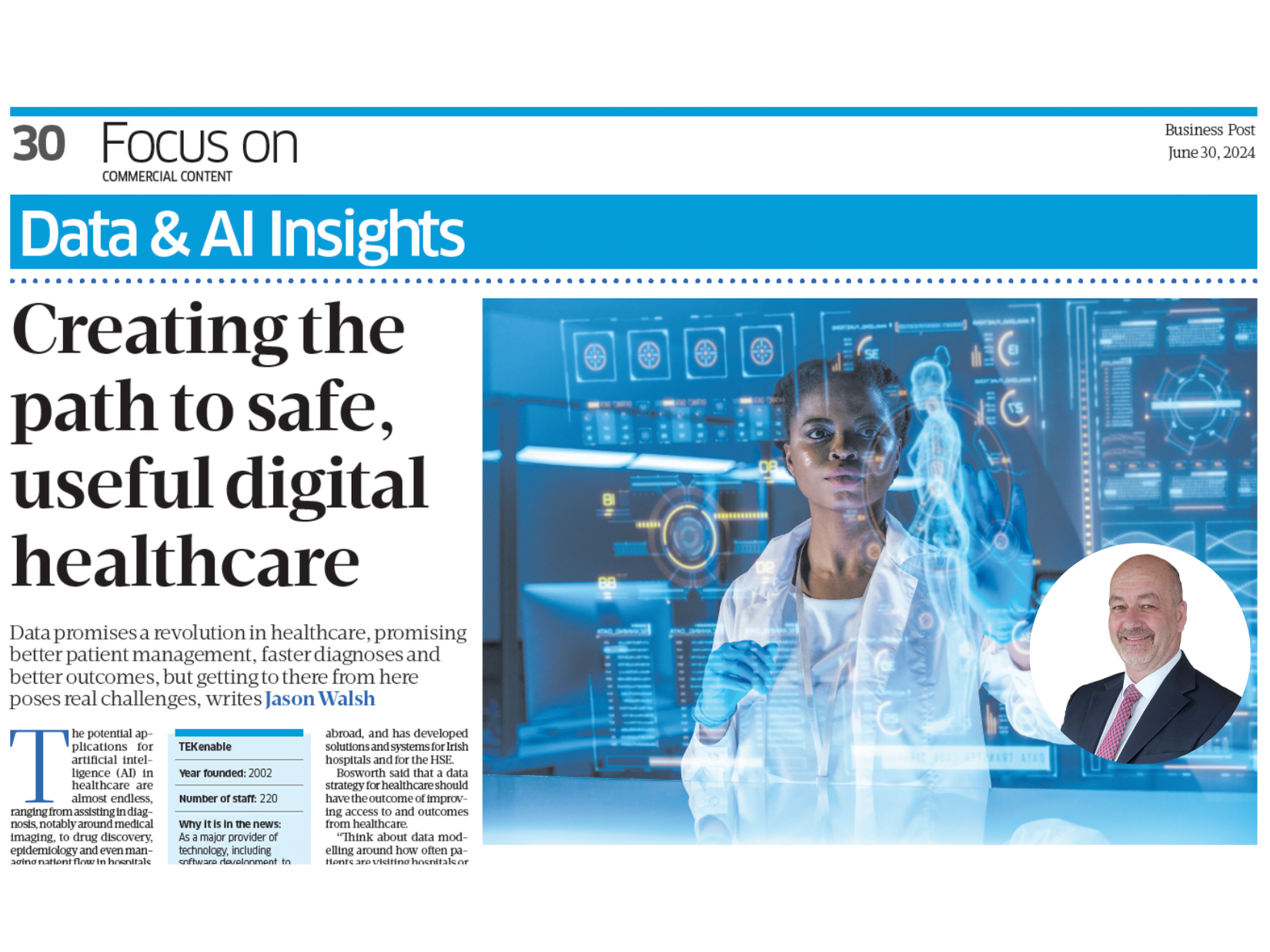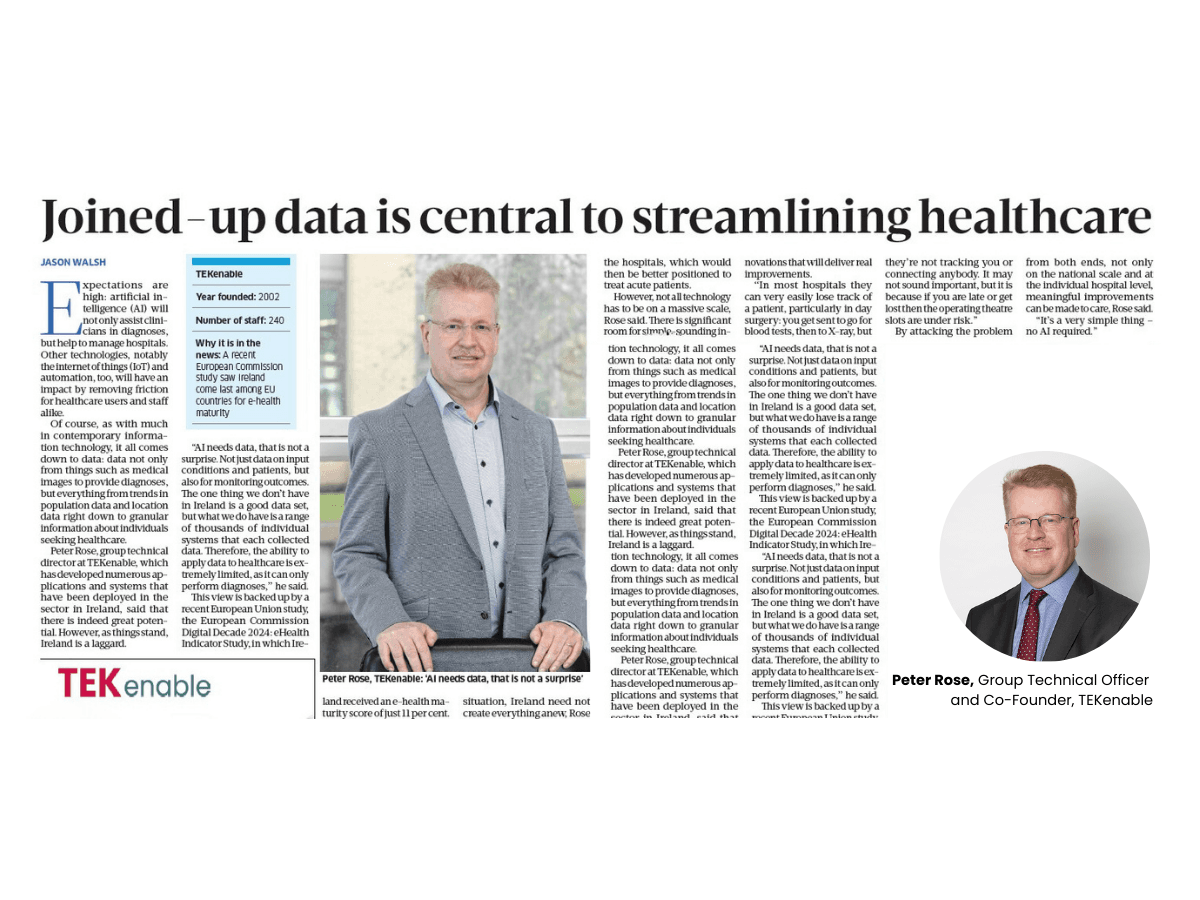Data promises a revolution in healthcare, promising better patient management, faster diagnoses and better outcomes, but getting to there from here poses real challenges
John Bosworth, Commercial Lead for Healthcare, Medtech & Life Sciences, TEKenable
The potential applications for artificial intelligence (AI) in healthcare are almost endless, ranging from assisting in diagnosis, notably around medical imaging, to drug discovery, epidemiology and even managing patient flow in hospitals.
What each and any of these demand, however, is data, and lots of it. Happily, that data does exist. Indeed, recent statistics estimated that 30 per cent of the world’s data is created by healthcare. However, an estimated 70 per cent of that is unstructured data that tends to go unused, or under-used.
In addition, the volume of data is growing: according to analysts IDG, the period 2018 to 2025 is expected to see a compound annual growth rate (CAGR) in healthcare data of 36 per cent, significantly higher than expected CAGR growth in financial services of 26 per cent or media and entertainment of 25 per cent.
John Bosworth, commercial lead for healthcare, medtech and life sciences at TEKenable, said he thinks AI and data will have a major impact. However, he said, there is a lot of work to do before we see its transformative potential.
“One of the biggest problems that healthcare has, and this has come up at conferences I’ve attended, is that a lot of hospitals have legacy systems. As a result, the big question and challenge is about getting access to the data: how do you get it out of the silos so that you can analyse it, with AI or otherwise,” he said.
TEKenable has deep roots in healthcare, in Ireland and abroad, and has developed solutions and systems for Irish hospitals and for the HSE.
Bosworth said that a data strategy for healthcare should have the outcome of improving access to and outcomes from healthcare.
“Think about data modelling around how often patients are visiting hospitals or developing an understanding of conditions. Today, there isn’t a single pane of glass for that patient and their record,” he said.
There should be a patient record from the day you’re born until the day you die –GP visits, post-op care, everything
AI is not a magic wand, Bosworth said, and it can only truly function if the datasets are there for it. In other words, AI is good at taking data and streamlining it, but you need to have the data, and it has to be readable.
“There is a recognition, in the HSE and other organisations, that with better-quality data AI can be useful around things like trends in diseases, perhaps catching them earlier, but you need a good dataset to pull that understanding from,” he said.
A major issue is the lack of a single patient record, though.
“There should be a patient record from the day you are born until the day you die – GP visits, hospital visits, pharmacy visits, post-operative care, everything,” he said.
Naturally, this raises issues around not only information security but also privacy and compliance. However, none of the challenges, whether resulting from the need to comply with EU General Data Protection Regulation (GDPR) or the forthcoming AI act, are insoluble.
Ultimately, any digital healthcare plan, such as patient records, needs to recognise the patient as a rights-bearing subject in charge of themselves and their data, not an object to whom things are done.
“Medical data is obviously sensitive and there are issues around sharing it, but, in the end, the patient, the individual, needs to be able to decide what is shared,” Bosworth said.
The picture across Europe is mixed on data in healthcare, and on digital healthcare in general. Ireland, however, is not really a leader in the field, Bosworth said.
“I think Ireland is a little behind, to a certain extent anyway. You can see it in the many disparate systems.
“The good news is that the Department of Health has launched its Digital Health Framework, which includes a digital health app that will give control to the patients and enable sharing across agencies but, again, controlled by the individual. They have a roll-out plan with short, medium and long-term objectives,” he said.
However, Bosworth said that the current situation can be summed up as an opportunity for the healthcare providers to catch up, grow and transform digitally.
This is not just about medical data, either, he said. After all, hospitals are large organisations, with a lot of ancillary activity from payroll to catering.
“We all often talk about data around patients, but there are other areas of data: procurement data and supply chain data, for example. We shouldn’t overlook the fact that these organisations have things like an ESG strategy,” he said.
The point, he said, is to recognise that whether the question at hand is directly medical or surgical or related to some other aspect of a hospital’s day-to-day operations, data needs to be at the core of the strategy.
“Data drives the vision. Without getting the data ready you are not going to achieve it,” he said.
The above text was reproduced from the interview published in BusinessPost on June 28th, 2024.





